One of the few elements of the War of 1812 remembered by Americans today is that the Battle of New Orleans made a hero of Andrew Jackson. This crowning achievement to the Unites States’ second victorious war against Great Britain is one of the most remarkable battles in the annals of American military history.
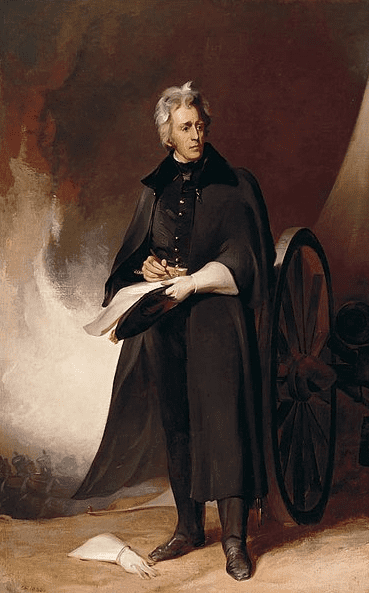
For one thing, there is this: The Battle of New Orleans, arguably the most famous battle of the War of 1812, should never have taken place – because for the most part the battle occurred after the war had ended! The fighting began on 23 December 1814, and the next day in Ghent, Netherlands (currently Belgium), the Treaty of Ghent was signed ending the war. Communication was slow in those days, and news of the war’s end did not arrive until well after the Battle of New Orleans’ climax on 8 January 1815.
Another surprising aspect of the battle is the composition of Jackson’s ragtag army. To supplement the Louisiana militia, Kentucky and Tennessee militiamen and irregulars made the long trek to New Orleans to support their hero Jackson. Some of the Choctaw warriors Jackson had used in his 1814 Creek War joined him as well. Finally, and most surprising, Jackson’s little army was augmented by Jean Lafitte and his pirates, who had been promised pardons if they would help Jackson defend New Orleans.
Perhaps the most remarkable aspect of the Battle of New Orleans is the number of troops involved in the fighting and the resulting casualties. Arrayed against a powerful British invasion force of 14,000 men, Jackson’s force consisted of about 4,000 fighters. Yet somehow, when the smoke cleared on the fateful day of January 8, the British had suffered around 2,000 casualties – Jackson’s army only had 7 men killed and 6 wounded!
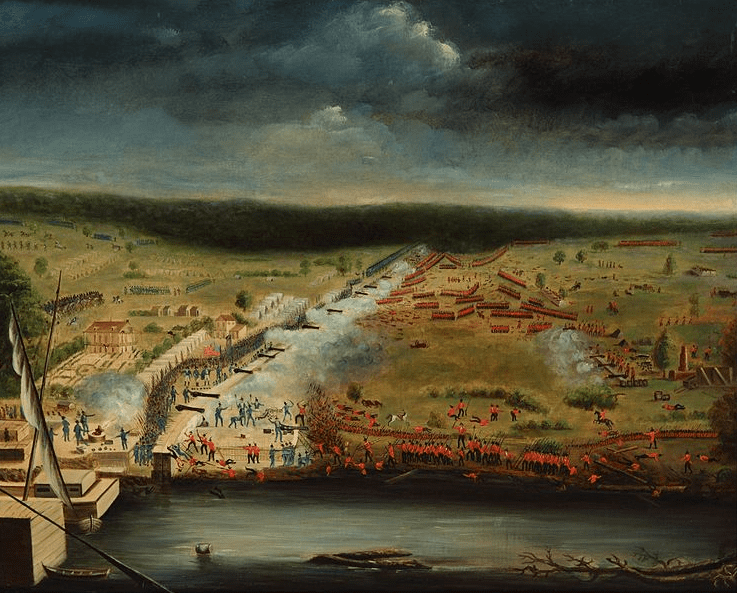
The British attacked at dawn, marching across an open field against an American force strongly entrenched in earthworks supported by a dozen cannon, sandwiched between the Mississippi River and a cypress swamp. During the battle the British lost many of their senior commanders, and the confused troops milled around uncertain how to proceed, all the time being raked by concentrated rifle fire and grapeshot from the cannon. The resulting slaughter was a tremendous victory for Jackson and the Americans, and an utter disaster for the British.
From the moment Jackson arrived in New Orleans on 1 December 1814, the city’s population felt encouraged and determined to put up a stiff resistance:
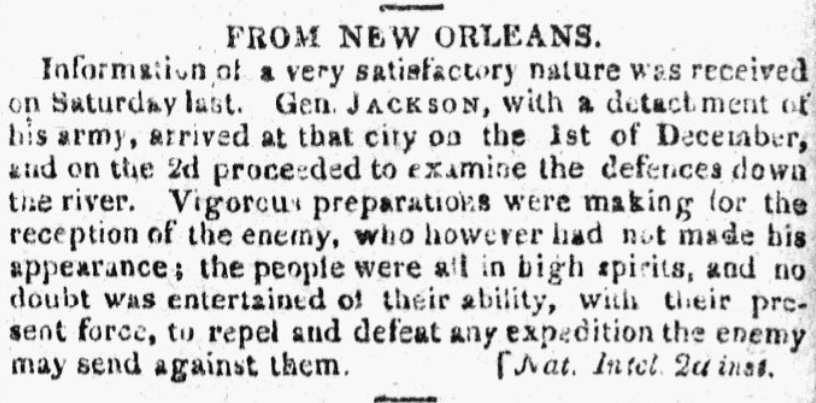
Here is a transcription of this article:
FROM NEW ORLEANS.
Information of a very satisfactory nature was received on Saturday last. Gen. JACKSON, with a detachment of his army, arrived at that city on the 1st of December, and on the 2d proceeded to examine the defences down the river. Vigorous preparations were making for the reception of the enemy, who however had not made his appearance; the people were all in high spirits, and no doubt was entertained of their ability, with their present force, to repel and defeat any expedition the enemy may send against them.
The same confidence is expressed in this article, although it’s wildly optimistic as to the eventual size of Jackson’s army:
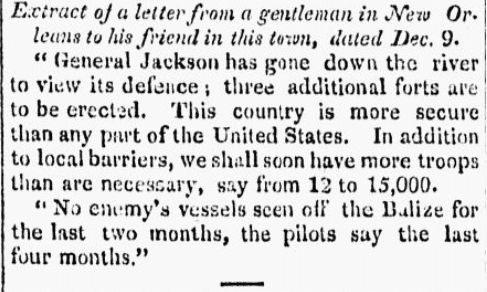
Here is a transcription of this article:
Extract of a letter from a gentleman in New Orleans to his friend in this town, dated Dec. 9.
“General Jackson has gone down the river to view its defence; three additional forts are to be erected. This country is more secure than any part of the United States. In addition to local barriers, we shall soon have more troops than are necessary, say from 12 to 15,000.
“No enemy’s vessels seen off the Balize for the last two months, the pilots say the last four month.”
Not everyone was so optimistic, however. Note the despairing tone of this article, printed after the climax of the Battle of New Orleans but before the editors knew of the battle’s outcome:
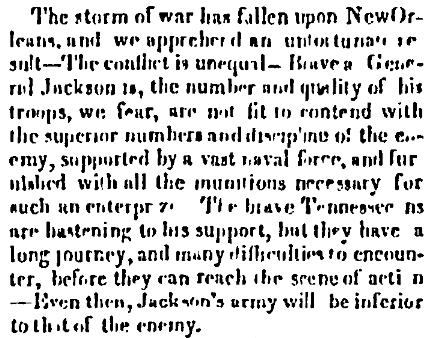
Here is a transcription of this article:
The storm of war has fallen upon New Orleans, and we apprehend an unfortunate result – The conflict is unequal – Brave as General Jackson is, the number and quality of his troops, we fear, are not fit to contend with the superior numbers and discipline of the enemy, supported by a vast naval force, and furnished with all the munitions necessary for such an enterprise. The brave Tennesseans are hastening to his support, but they have a long journey, and many difficulties to encounter, before they can reach the scene of action – Even then, Jackson’s army will be inferior to that of the enemy.
When the climax of the battle began the morning of January 8, Louisiana Governor William C.C. Claiborne rushed to the front lines and witnessed the remainder of the fighting. The next day, he described what he saw in a letter to Governor Shelby of Kentucky, published in this article:
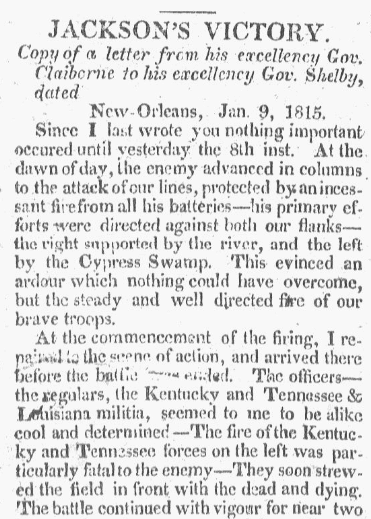
Here is a transcription of this article:
JACKSON’S VICTORY
Copy of a letter from his excellency Gov. Claiborne to his excellency Gov. Shelby, dated
New Orleans, Jan. 9, 1815.
Since I last wrote you nothing important occurred until yesterday the 8th inst. At the dawn of day, the enemy advanced in columns to the attack of our lines, protected by an incessant fire from all his batteries – his primary efforts were directed against both our flanks – the right supported by the river, and the left by the Cypress Swamp. This evinced an ardour which nothing could have overcome, but the steady and well directed fire of our brave troops.
At the commencement of the firing, I repaired to the scene of action, and arrived there before the battle was ended. The officers – the regulars, the Kentucky and Tennessee & Louisiana militia, seemed to me to be alike cool and determined – The fire of the Kentucky and Tennessee forces on the left was particularly fatal to the enemy – They soon strewed the field in front with the dead and dying. The battle continued with vigour for near two hours, when the enemy retired from the contest.
I cannot, with any kind of certainty, state their loss in killed, wounded, and prisoners: It is however estimated at from 12 to 1500 – among the killed are a Col. Raney, a Maj. Pringle and many other officers – Among the prisoners, I have seen 15 or 16 officers, most of whom are wounded.
It is a matter of equal joy and wonder that in a conflict so long, so glorious to us, and so fatal to the enemy, our loss is astonishingly small – It is not believed to exceed in killed and wounded 25 or 30, among whom I have not heard of one officer.
The entrenchments protected our men from the fire of the enemy, and altho’ their batteries poured forth a shower of shells, balls and rockets, they did very little injury, for most part overshooting the lines, and falling harmless in the field behind.
The commanding Gen. Jackson will give to government the particulars of a day no less honourable to him, than profitable to his country – He will do justice to his brave army, and his distinguished brothers in arms, Gens. Carroll, Thomas, Adair, and Coffee and many others whose merits he can justly appreciate.
The victory of the American arms would have been complete, and Louisiana probably delivered at once from an invading foe, but for the momentary success of the British on the opposite or west side of the Mississippi.
Batteries had been erected there to annoy the enemy’s lines, and under the brave Commodore Patterson, had gloriously contributed to our success. They were protected by a detachment of the Kentucky and Louisiana militia under Brig. Gen. Morgan of this State. Pending the attack on our lines, a part of the enemy, the force of which is not correctly ascertained, but is supposed to be inconsiderable, crossed the river and owing to some cause, not yet accounted for, our troops speedily gave way and the brave Commodore was compelled to spike and abandon his cannon. Gen. Morgan is understood to be cool and collected, and to have made many efforts to rally his men. Gen. Jackson was prompt in reinforcing him, so as to check the enemy’s advance, and we hope today to hear of our batteries being reoccupied.
I am, &c.,
Wm. C. C. Claiborne.
P.S. Since writing the above I have had the pleasure to learn that the enemy has abandoned our batteries on the opposite shore, and recrossed the river; he has also suffered more in the action of the 8th than I at first imagined. Their commander, Lieut. Gen. Pakenham, is said to have been killed, and his second in command, Maj. Gen. Keane, badly wounded.
After the victorious battle, General Jackson wrote a letter to the Secretary of War describing the fighting. It was published in this article:
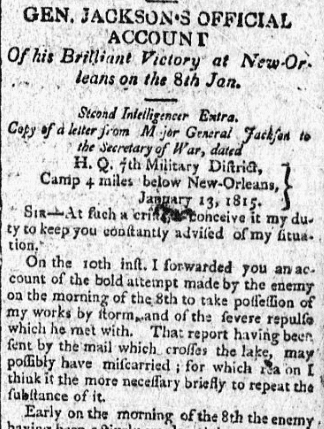
Here is a transcription of this article:
GEN. JACKSON’S OFFICIAL ACCOUNT
of His Brilliant Victory at New Orleans on the 8th Jan.
Second Intelligencer Extra.
Copy of a letter from Major General Jackson to the Secretary of War, dated
H.Q. 7th Military District,
Camp 4 miles below New Orleans,
January 13, 1815
Sir – At such a crisis I conceive it my duty to keep you constantly advised of my situation.
On the 10th inst. I forwarded you an account of the bold attempt made by the enemy on the morning of the 8th to take possession of my works by storm, and of the severe repulse which he met with. That report having been sent by the mail which crosses the lake, may possibly have miscarried; for which reason I think it the more necessary briefly to repeat the substance of it.
Early on the morning of the 8th the enemy, having been actively employed the two preceding days in making preparation for a storm, advanced in two strong columns on my right and left. They were received, however, with a firmness which it seems they little expected, and which destroyed all their hopes. My men, undisturbed by their approach, which indeed they had long anxiously wished for, opened upon them a fire so deliberate and certain, as rendered their scaling ladders and fascines, as well as their more direct implements of warfare, perfectly useless. For upwards of an hour it was continued, with a briskness of which there have been but few instances perhaps in any country. In justice to the enemy it must be said, they stood it as long as could have been expected from the most determined bravery. At length, however, when all prospect of success became hopeless, they fled in confusion from the field – leaving it covered with their dead and wounded. Their loss was immense. I had at first computed it at 1500, but it is since ascertained to have been much greater. Upon information, which is believed to be correct, Col. Haynes, the inspector Gen., reports it to be in the total 2600. His report I enclose you. My loss was inconsiderable, being only seven killed and 6 wounded. (This was in the action on the line – afterwards a skirmishing was kept up in which a few more of our men were lost.)
Such a disproportion in loss, when we consider the number and the kind of troops engaged must, I know, excite astonishment, and may not everywhere be fully credited; yet I am perfectly satisfied that the account is not exaggerated on the one part, nor underrated on the other.
The enemy having hastily quitted a post which they had gained possession of, on the other side of the river, and we having immediately returned to it, both armies at present occupy their former positions. Whether, after the severe losses he has sustained, he is preparing to return to his shipping, or to make still mightier efforts to attain his first object, I do not pretend to determine. It becomes me to act as though the latter were his intention. One thing, however, seems certain – that if he still calculates on effecting what he has hitherto been unable to accomplish, he must expect considerable reinforcements; as the force with which he landed must undoubtedly be diminished by at least 3000. Besides the loss which he sustained on the night of the 23d ultimo, which is estimated at four hundred, he cannot have suffered less between that period and the morning of the 8th inst. than 300 – having, within that time, been repulsed in two general attempts to drive us from our position, and there having been continual cannonading and skirmishing during the whole of it. Yet he is still able to show a very formidable force.
There is little doubt that the commanding General, Sir Edward Pakenham, was killed in the action of the 8th, and that Major Generals Keane and Gibbs were severely wounded.
Whenever a more leisure moment shall occur, I will take the liberty to make out and forward you a more circumstantial account of the several actions, and particularly that of the 8th, in doing which my chief motive will be to render justice to those brave men I have the honor to command, and who have so remarkably distinguished themselves.
I have the honor to be, most respectfully, your obedient servant,
Andrew Jackson, Major General Commanding.
P.S. – A correct list of my killed and wounded will be forwarded you by the Adjutant General.
Note: An online collection of newspapers, such as GenealogyBank’s Historical Newspaper Archives, is not only a great way to learn about the lives of your ancestors – the old newspaper articles also help you understand American history and the times your ancestors lived in, and the news they talked about and read in their local papers. Did any of your ancestors fight in the Battle of New Orleans? Please share your stories with us in the comments section below.
Explore over 330 years of newspapers and historical records in GenealogyBank. Discover your family story! Start a 7-Day Free Trial

Thank you for this. Late in my life, I’m just beginning to enjoy being a Pace.
Glad you enjoyed the article, Sherry!
Enjoyed the article. My ancestor, James Smith, fought alongside General Andrew Jackson in The Battle of New Orleans, and I believe he was an Officer from Tennessee. Do you have anything about him, who was a General of the Texas Republic and Inspector General under Sam Houston.
Thanks for contacting us, Josanna, and I’m glad you enjoyed the article. I don’t have anything about James Smith, but it would be worthwhile to search GenealogyBank’s newspapers to see if there is any information about him in that collection.